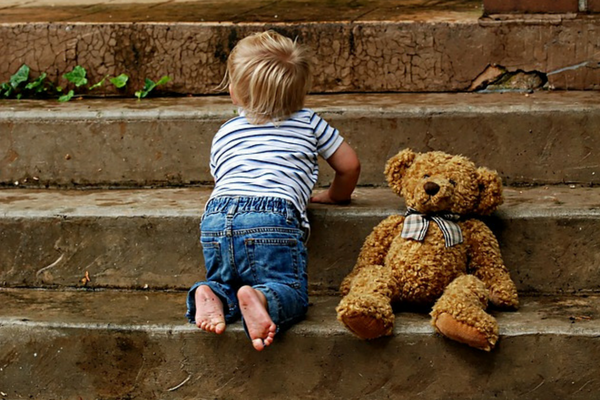It’s been a year since Jane the Virgin star Justin Baldoni posted this picture on Twitter, and it has impacted the way I parent every day since then. Baldoni, standing with his father, watching an epic toddler meltdown in a grocery store, wrote about “being comfortable in the uncomfortable” which encompasses 99 percent of toddler parenting anyway. His post has made me think about what rights toddlers have as small humans: to think, to feel, to exist.
” I try to remember to make sure my daughter knows it’s OK that she feels deeply. It’s not embarrassing to me when she throw tantrums in the grocery store, or screams on a plane. I’m her dad…not yours. “
 1. The right to occupy space in a public place
1. The right to occupy space in a public place
Toddlers that need to lay on the floor to work out their drama, like in the tweet, should have the ability to do so without judgement against themselves or the parent. Some parents drag their kids to the car at the first peep they make, and others let their kids have full on writhing tantrums in restaurants for 30 minutes. I’m talking about a happy medium here. In the tweet, the toddler is being supervised but is also taking up space differently than an adult would (by laying on a grocery floor) and that should be okay, too.

2. The right to make (some) noise
I have been out to dinner and experienced a tipsy middle-aged woman at the table next to me who is more annoying to listen to than any toddler could ever be. A California restaurant recently got lots of praise and criticism for posting a sign saying no strollers, high chairs, or booster seats, implying that children are not welcome. The fact is, some two-year-olds are better behaved than some adults, and with the right parenting and discretion, should be able to eat out if the parents choose, like anybody else. The question is, how much noise is acceptable, especially in a restaurant? For me, it’s more about the length of time than the volume. If my child makes one loud noise or laughs loudly, that’s a lot different than ongoing crying, whining, high pitched shenanigans that disrupt the entirety of someone else’s dinner. Regardless, if a middle-aged woman can tell a story about her last shopping trip at a volume higher than a toddler’s giggling crayon game, then they both have the right to exist in the same restaurant. Or maybe she needs to leave.
3. The right to ask honest questions
Every parent has experienced questions from their own toddler in public that make them look left and right to see who heard. “Why does that lady’s face look like that?” “How did the baby get into your belly?” “Why’s that man so big?” The questions are unavoidable as toddlers tell the honest truth without the social norms of society stopping them. I believe for adults it shouldn’t be the question that is embarrassing, and more attention should be placed on how the adult answers. I’ve heard parents say “It’s not nice to ask that.” While that may be true, what have we taught the kid? How are they going to learn real answers? So instead, I hope to encourage honest questions, even when around others, with honest answers. Sometimes the vaguer the better (example: we all were made in different shapes and sizes, perhaps).
Toddlers may not be able to speak up for their rights, but they sure can speak up in general. I hope to keep Baldoni’s encouragements in mind as we enter the depths of the “threenager” stage and beyond.
See you at the grocery…I’ll be the one watching my toddler “express himself” in the cookie aisle.












